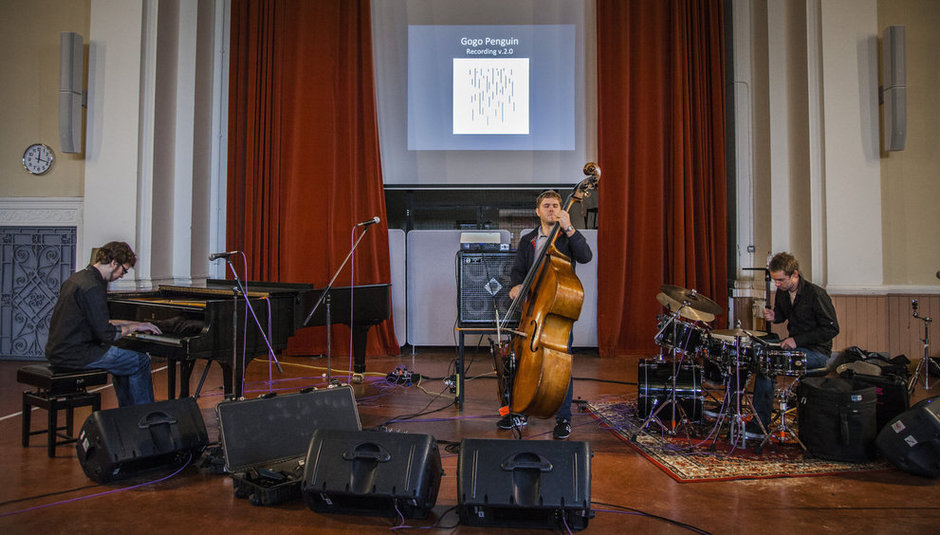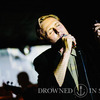Ahead of this year's Mercury prize, DiS in partnership with Naim Audio's new wireless music system, mu-so, will help you GoDeeper into 2014's nominated albums. Today, we would like to turn your attention to jazz trio GoGo Penguin, with the launch of our new jazz column. Visit our Mercury mini-site for for our review of their album, plus more coverage of all of this year's nominees.
Album Stream
Gogo Penguin. Polar Bear. Jazz bands. Mercury Prize Nominees. The formula to their success? Names that include animals from our planet's extremities. Obviously. In all seriousness, the appearance of two jazz acts amongst the nominees may finally put pay to the Token Jazz Band tag that has hung over past jazz nominees like a bad smell. The Mercury prize purports to help give artists a boost in both sales and popularity, however previous TJBs (see Roller Trio, Gwilym Simcock, Led Bib - all by the way still very much active and still very good) have experienced a brief moment in the sun before drifting out of sight of the mainstream eye, forever 'Jazz Famous' and forever pre-fixed by 'Mercury Nominated'.
Polar Bear are of course no strangers to the award, having been nominated in 2005, and they are one of the few TJBs who have maintained a semblance of mainstream presence since then. The absence of a "who the fuck are Polar Bear?" reaction this time round said a lot about their enduring popularity and, it should be noted, fairly widespread media coverage for the album, the excellent IN EACH AND EVERY ONE (reviewed here on DiS). So, enough about Polar Bear, you all know who they are and I have a word limit.
Gogo Penguin are likely to be a new name to many of you, though with an arguably more accessible sound than Polar Bear, it's tricky to understand their relative obscurity. Based in Manchester and formed of pianist Chris Illingworth, bassist Nick Blacka and drummer Rob Turner, they've been the buzz band of the UK jazz scene since they released their debut album 'Fanfares' 2 years ago, an exciting, if flawed mix of modern piano jazz, contemporary classical and skittering breakbeats. They followed it up with the now Mercury-nominated ‘v2.0’, released earlier this year, and it’s a significant development of their sound that ironed out the bugs of their debut and features some quite astonishing acoustic renditions of digital effects. I caught up with Rob for a quick chat on the Mercurys, v2.0, jazz and the next step.
DiS: What were your thoughts when you got the mercury nomination?
Rob Turner - It’s pretty surprising, bit of a shocker – I don’t think we ever thought what we do would get to that kind of level. Initially, we were quite happy just playing it in our living room, just practicing, then we made that first album ourselves and produced it ourselves, then Matt [Halsall, trumpeter and owner of Gondwana Records] came along and did the whole release, did that record label thing to it! We never had any plans for it, I remember just getting it played on Gilles Peterson and just thinking ‘what the fuck, this is mental, this thing that we made is on the radio!’ so now to have people taking photos of us is pretty weird. It’s kind of funny as well, really.
DiS: Looking back on past jazz nominees, do you think that they didn’t make as much of it as they could have done and you’re in a better position?
Rob Turner - I don’t really know I mean there’s different music for different people and jazz music is a bit more niche, specialist, so it kind of makes sense there’s not much media attention. I’m not sure what we do is necessarily jazz but I guess it’s still pretty niche.
DiS: Do you feel then that the jazz tag is unhelpful, would you prefer to disassociate yourself from it?
Rob Turner - I don’t even really know what the jazz thing is. Fundamentally you’ve got music that’s sort of manufactured, and you’ve got music that’s just people who are into sound and playing with sound, that’s the only real difference I’d make between anyone that’s making music, if any. It’s all just notes at the end of the day. I think a lot of it [genres] is an identity for the people that consume it more than it is for the musicians who make it and people get trapped in these kind of things, people want to belong to something. I think for us we’re kind of more interested in sound and see music as more of a longer tradition, going back right to start of species counterpoint or when people first started writing music down. The fact that our music has got improvisation means that people in the media have to call it jazz because jazz and improvisation are associated together. I think jazz musicians tend to see the thing that’s unique about jazz music is the improvisation, that none of the other genres have that and, to be honest, it’s just weird, I’ve got no idea, I just like tunes. Music is a phenomenon in the world – it’s kind of like water, it forms these globules then they come apart to form other globules, but ultimately it’s all just one body, one discipline. There’s this book I’m reading at the moment by Hazrat Inayat Khan called The Mysticism of Sound and Music and his whole take on it is that music is actually a philosophy, a precursor to mathematics, that it’s the first social practice human beings got involved with, even prior to language. So his vibe on it is that it’s all there already so everything else, genres, fashions etc. is just stuff that develops around music, and it ends up being quite far removed from the fundamental premise of it all.
DiS: Let’s talk about v2.0, it’s a marked development on ‘Fanfares’, it feels like you’re really discovering your own sound?
Rob Turner - v2.0 is a progression from the first one [fanfares] – that was a bit more jazzy - I think we came from a jazz group background, and then have slowly moved towards the sound that we actually wanted to produce. With our dance music influences, production’s obviously a really important part of it so we wanted a bigger sound but I think we also wanted to make the ideas that we had a bit more clear and deliver them in a simpler way, a bit more refined, a bit more polished. Everything’s been fairly deliberate, we wanted a more produced sound so we’ve got a fourth member of the band now who does all our live sound wherever we go, and he’s really integral to it. The way we work is we write tunes and ideas, normally away from each other, then we kind of come together and develop them into other things – we use all techniques from different worlds, some of its stolen from very classical ideas on structuring music using cells and that kind of thing, and some of it’s a bit more freeform jazz, just making a load of sound and seeing what happens then extracting the bits you want to keep and developing them. Then some of its like the way you’d make a drum n bass track, just building layers, pulling them apart then piecing them back together.
DiS: The nods to electronic music are much more prominent on this record [their press releases cite Fourtet, Jon Hopkins and Flying Lotus as key influences] and the acoustic versions of digital effects are undoubtedly becoming part of your signature sound, but would you ever consider adding a substantial amount of electronics into the mix or would you prefer to keep it acoustic?
Rob Turner - We’ve done quite a lot of messing around with that [electronics] actually, I think we might eventually start getting involved with some more complicated things but I think for now we don’t really feel like we’ve exhausted the possibilities of doing it all acoustically. There’s still a lot of things we want to try out. With the electronic stuff, it’s amazing music but when you’re playing it live there’s something that doesn’t quite feel right about it – you don’t quite get the same buzz from hitting a drum pad as you do from hitting a real drum.
DiS: Do you think it would subdue your live show? For me part of the appeal is seeing all these effects and sounds brought to life with acoustic techniques, it can be boring where someone stands behind a keyboard rack or drumpads triggering sounds.
Rob Turner - Yeah didn’t Aphex Twin once do a gig where he stood behind a laptop playing pacman then went home? I’ve heard stories like that with DJs on stage just checking facebook and that’s just a bit odd. I think there’s something lost in the moment of making the music, because when you’re playing those instruments in that moment there’s something special in that, just the way time works, the music is actually happening in front of you, it’s not like data-entry and pre-planned.
DiS: What do you think your next step is – keep doing the same thing? It’s quite a trend at the moment to get bigger – be it more production, more instruments, team up with orchestras, producers, vocalists, what are your plans?
Rob Turner - I don’t know to be honest, I think we’re going to continue just with the 3 instruments for now, we’re quite interested in making music for computer games, film scores as well, because we do quite a lot of that anyway [away from Gogo Penguin the 3 members are composers in their own right] – not on a big level but again it’ll be one of those things where we just do what feels right. In terms of doing the big collaboration thing, it’s funny- it’s really nice to have the media attention and be in the magazines and stuff, but at the same time we’re still grounded and it all seems a bit silly – I don’t think we’re going to be doing the whole celebrity thing with Bono. In fact we’re going to do an album with Bono and stick it on everyone’s iPhones. I think we’ll pretty much stick to what we’re doing but there’s a few people who, if the opportunity came, we’d certainly get involved. Maybe if Thom Yorke wanted to retire and do a jazz album!
DiS: Do you keep an eye on the UK jazz scene, and is there anyone you admire or would like to play with, any peers you want to recommend?
Rob Turner - UK-wise, a lot of it is pretty weird, pretty bonkers – which I think you kind of need that really. If jazz has a place, that’s its place: The experimental world and just going for it! I really like Paddy Steer, I don’t think it’s really jazz but it’s weird so it ticks a couple of boxes.
Matt Halsall has just signed Mammal Hands and they’re really cool, I do like that. The thing that I like about Mammal Hands is that they’re a band, they’re really good mates and they make music together, and what puts me off is that a lot of the jazz scene is people just promoting themselves as this profound, I don’t know, God of sound, and I find that a bit odd if I’m honest.
I think when you look back at jazz, the kind of musicians that people tend to idolize are actually bands, the Bill Evans Trio, The John Coltrane Quartet, all that music was as much of a result of those guys in the bands being together all the time and making music together. They’re all integral to the sound, if you remove one of them the whole thing falls down like a house of cards. And Miles Davis, again, every single time he did something he made a band – even though he was the figurehead, he was specific about who was going to be in it, and they then did big tours of that project. I can’t actually think of a single jazz artist that wasn’t actually a band, none that’s really made an impact. Jazz can be quite intimidating, a lot of people say they don’t like jazz because it’s hard work, it takes a bit of effort, but it’s rewarding.
‘V2.0’ is available now on Gondwana Records, Gogo Penguin are currently on tour, for more info visit gogopenguin.co.uk.
The second edition of That Token Jazz Column is coming very soon.
Lead image via Salford.ac.uk.






















